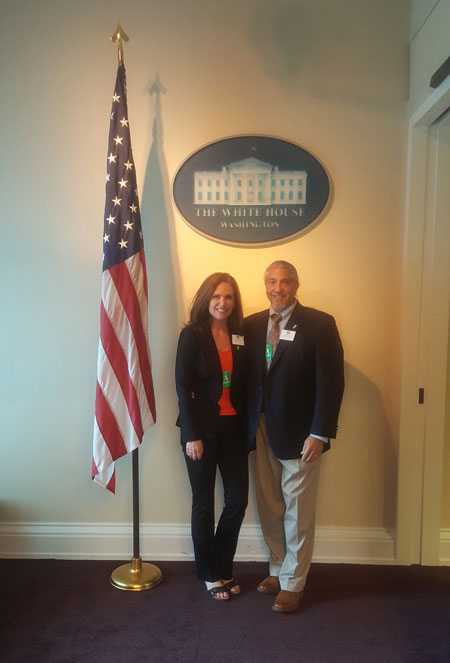
Two representatives from Oklahoma State University recently visited the White House to contribute to a workshop on the Obama Administration’s Promise Zones initiative, which provides federal support to local leaders in high poverty urban, rural, and tribal communities across the country.
Elizabeth Payne, director of the OSU Center for Sovereign Nations, and John Chaney, director of the OSU Center for American Indian Studies, participated in the day-long workshop, which included leading researchers, academic institutions, and representatives from 22 designated Promise Zones. The effort is intended to accelerate local economic progress and ensure long-term success by forging university partnerships.
“The White House audience was enthusiastic about our center strategy for community engagement,” Payne said. “We were honored to share our experience with attendees and to represent President Hargis’ vision.”
Created through the investment of The Chickasaw Nation and OSU, the Center for Sovereign Nations recently celebrated its first anniversary. New center partner, the Choctaw Nation, has implemented a number of successful Promise Zone projects, including an environmentally sustainable steel manufacturing mill that will support approximately 300 new jobs. Other Choctaw Nation Promise Zone projects include the Early Head Start-Childcare Partnership Grant and other grants that provide technological and educational support to the community.
The Promise Zone designation offers 10 years of federal support for local leaders to tackle issues such as jobs, education, affordable housing, reducing violent crime, and other locally-defined priorities. Payne and Chaney have been involved in seeding several Promise Zone projects between OSU and the Choctaw Nation, including a College of Education Summer School Intern project, a College of Agriculture Seed Saving and Nutrition project, and an entomology project. Payne described these projects and her center’s community engagement during a breakout session at the workshop.
“We had the opportunity to interact with and learn from a number of Promise Zone directors from across the country,” Chaney said. “We also had the opportunity to hear presentations from members of President Obama’s cabinet and advisors, including Julian Castro, Department of Housing and Urban Development secretary and Lilian Salerno, USDA under secretary for Rural Development.
Payne and Chaney have already conducted follow-up conversations with attendees of the workshop and have been invited to the First Tribal Promise Zone Convening to be held in Durant, Okla. in October.
